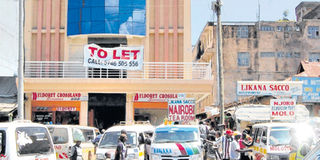No takers for space in town centre

There are many unoccupied commercial buildings in the central business district in Nakuru town. PHOTO| FILE| NATION MEDIA GROUP
What you need to know:
- Only supermarkets and banks occupying ground floors seem to be doing booming business.
- Property owners in the CBD are now receiving unusual investors, who want to turn their empty space into prayer halls.
- Before the advent of devolution, getting office space in the country’s fourth largest town was not easy.
As Nakuru town embarks on its ambitious target of becoming a city, with tremendous growth in the property segment, property owners in the central business district (CBD) are staring at empty office space.
Ultra-modern high-rise buildings providing commercial office space have remained empty as demand hits an all-time low.
This is coming at a time when Governor Lee Kinyanjui’s administration is digitising the approval of building plans to reduce the time it takes investors to begin their projects.
Mr Kinyanjui said his administration has received building plans worth Sh15billion for approval.
Low-hanging banners announcing space to let are now common in most of the old, and even the newest, commercial buildings.
The situation is no different along Biashara Street in the Industrial area as similar banners announcing godowns to let are also common.
A big chunk of office space that was previously housed hotels was first converted into a casino, then later abandoned as high rents and shrinking business hit investors hard.
Only supermarkets and banks occupying ground floors seem to be doing booming business.
Property owners in the CBD are now receiving unusual investors, who want to turn their empty space into prayer halls.
Before the advent of devolution, getting office space in the country’s fourth largest town was not easy.
Many budding investors trooping into the capital of the Rift Valley were scrambling for office space in town.
Having an office in the CBD was a status symbol as more investors trooped in, with real estate agents making a killing selling office space.
However, today, most of the office blocks along the two-kilometre Kenyatta Avenue and other streets such as Moi, Pandit Nehru, Mburu Gichua, Government road and Oginga Odinga have been abandoned.
Both old and new clients are migrating from the town centre to the town’s outskirts.
Meanwhile, budding entrepreneurs are sharing office space to reduce costs amid skyrocketing rents and other overhead costs that are increasing by the day.
“When I started renting out space in this building, each client would occupy their own office. Buttoday I’m seeing a trend where new clients are sharing offices,” said a caretaker in one of the buildings on Kenyatta Avenue.
Rent for ground-floor office space has risen to nearly Sh100 per square foot per month, a fivefold increase from about Sh20 per square foot not too long ago.
This has seen many investors move to the town’s outskirts, o where ents are more affordable.
The once lush green and serene posh estates such as the up-market Milimani and Section 58, which had single-dwelling units, now host a number of office blocks.
Mr Daniel Kigathi, an advertising and marketing consultant at Dapri Enterprises, blamed the shift to increased supply, which has surpassed demand.
“There are many offices to let, nyet many businesses have not stabilised after a long electioneering period while some have closed shop,” said Mr Kigathi.
And according to Ms Gladys Muhunyo, the marketing director of Ranges Estate, a leading real estate firm in Nakuru Town, the shift could be attributed to changing value proposition of the buildings.
“Property owners in posh estates are also facing a decline in tenants and investors looking for office space are ready to pay Sh45,000 a month, which is good value for money since they get ample parking space, and roomy office space and adequate water supply,” said Ms Muhunyo.
Lack of parking space in the CBD is major headache for motorists in Nakuru.
The rising number motorbike taxi operators and tuk tuks and mushrooming illegal matatu terminus in the CBD, which have taken up the remaining parking space, have made investors shy away from the town centre.
However, Governor Kinyanjui says plans are underway to acquire alternative land outside the CBD to built a matatu terminus.
Ms Muhunyo noted that some of the people who own old buildings, some of which were built in the 1970s, have refused to change with the times.
“The modern-day office seeker wants a building that has advanced features such as Wi-Fi connectivity,” said Ms Muhunyo.
She also observed that the old buildings that dot the skyline of the town’s CBD were built with the old mentality of closed offices, which is now outmoded.
“Today the concept of shared offices and open-office plan is taking root very fast and the old buildings do not offer such facilities, hence the migration from the CBD,” said Ms Muhunyo.
“The old buildings are only connected to the main power supply, but new tenants want to be assured of constant power supply in case of a blackout.”
She said most of the empty office spaces have no power back-up, forcing clients to migrate.
“The high rent might not necessarily be one of the reasons for shifting, but rather, the migration is all about quality of services offered because clients want to get value for their money,” said Ms Muhunyo.
The changing working style which makes it possible to work online has also contributed to reduced need for office space.
“Most of those in the digital generation work online, which this has reduced demand for office space, which should be a wake-up call for property owners to up their game and be more creative to attract new tenants,” she said.
“Kenyans are reengineering and are demanding value-addition, including in office space, because some of them work together since they they want to provide their clients with a one-stop shop where all they want can be handled,” said Ms Muhunyo.




